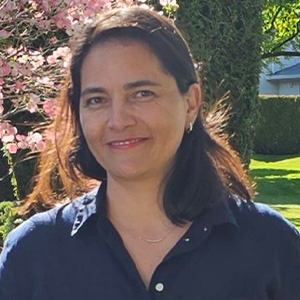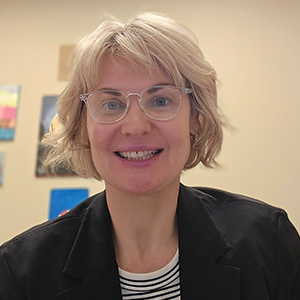We are excited to welcome back our Southern Medical Program students for the fall term. Meet some of our students as they gear up for another year of medical school across the Interior Health region.
 Name: Miranda Tsuyuki, 2nd year
Name: Miranda Tsuyuki, 2nd year
Hometown: Belcarra & Whistler, BC
What inspired you to pursue your program?
As the oldest of three, I’ve always felt a strong responsibility to care for others. Seeing my family’s struggles with trauma, mental health, addiction, and suicide showed me just how much of a difference compassionate doctors can make—or how hard it is when they’re not there. I studied biochemistry, forensic science, and psychology at UBC to understand the power and responsibility that comes with science. But it was really through lifeguarding, mental health peer support, ski patrol, paramedic training, and working with the RCMP that I learned what it means to help others with both skill and heart.
Why did you choose UBC?
UBC Medicine has always been my dream. BC is home, and I’m deeply grateful to stay close to my support system while learning from local experts in—I’m admittedly biased—the most beautiful place in the world. I’m a classic BC girl who loves skiing, hiking, and great sushi, so I’m thrilled not to miss out. Plus, my dad is a UBC Medicine alumnus, so it is pretty cool to think I am walking the same path he once did and share that connection.
What are you most looking forward to this year?
By the end of first year, I finally felt like I’d found my footing in medical school. This year, I’m excited to deepen my learning and push myself further in academics and research. Both inside and outside the classroom, I can’t wait to reunite with my classmates who have not only become loyal study partners, soccer teammates, and backpacking companions, but my close friends. I’m looking forward to resuming our coffee walks between lectures to Comma Café, taking a surfing trip to Tofino through the Wilderness Medicine club, and rocking our new matching SMP vests in clinic.
 Name: Chaase Byrne, 2nd year
Name: Chaase Byrne, 2nd year
Hometown: Flin Flon, Manitoba
What inspired you to pursue your program?
After spending 12 years working in construction, including three years at B.C. Hydro’s Site C Clean Energy Project in northeastern B.C., I was looking for a change that would be academically stimulating but still allow me to work closely with people.
Why did you choose UBC?
I had spent a large portion of the last 10 years working in B.C., so I have really come to love all that the province has to offer. Additionally, I enjoy the smaller size of UBC’s distributed medical program sites, leading me to ultimately choose Kelowna.
What are you most looking forward to this year?
I am looking forward to starting the transition into the clinical portion of medical school.
 Name: Emily Stone, 3rd year
Name: Emily Stone, 3rd year
Hometown: Victoria, BC
What inspired you to pursue your program?
It all began in grade 11 when I first learned about the endocrine system—I was hooked. At UBC Okanagan, my Human Kinetics degree deepened that fascination as I explored the musculoskeletal and nervous systems, each discovery sparking new excitement. However, it was working in a health clinic that truly inspired my passion for medicine. Watching physicians connect with patients—listening, comforting, and guiding them—showed me the profound impact of compassion in healthcare. Medicine is not just about solving medical problems, but about creating a space where people feel heard and supported. That’s the role I aspire to fulfill.
Why did you choose UBC?
UBC felt like the natural choice for me. I completed my bachelor’s degree at UBC Okanagan, where I had an incredible experience and felt constantly supported by both peers and faculty. I was especially drawn to UBC’s spiral curriculum, which aligns with the way I enjoy learning—building on knowledge while deepening understanding. Beyond academics, British Columbia holds a special place in my heart. Its beauty and endless opportunities for exploration make it feel like home, and with most of my family here, pursuing medicine at UBC means I can grow in both my career and personal life.
What are you most looking forward to this year?
Clerkship is the stage I have anticipated most since beginning medical school. From day one, I felt both excitement and nerves about finally applying my knowledge in real-world settings. The rotation I most looked forward to was rural family medicine, which I am completing as I write this. Experiencing the challenges and rewards of rural care firsthand has been incredible, bringing to life so many of the issues we learn about in the classroom. Still to come – I am also looking forward to delivering my first baby!
 Dr. Emily Stewart has been appointed as the new Year 1 & 2 Site Director for the Southern Medical Program (SMP). Dr. Stewart is a Kelowna-based emergency physician and a Clinical Assistant Professor with the UBC Department of Emergency Medicine.
Dr. Emily Stewart has been appointed as the new Year 1 & 2 Site Director for the Southern Medical Program (SMP). Dr. Stewart is a Kelowna-based emergency physician and a Clinical Assistant Professor with the UBC Department of Emergency Medicine.

 MD Undergraduate Program (MDUP) Student Affairs is pleased to announce the appointment of Dr. Mike Bergunder to the role of Assistant Dean, Student Affairs, Southern Medical Program (SMP) for a three-year term, until September 29, 2028.
MD Undergraduate Program (MDUP) Student Affairs is pleased to announce the appointment of Dr. Mike Bergunder to the role of Assistant Dean, Student Affairs, Southern Medical Program (SMP) for a three-year term, until September 29, 2028. Dr. Christopher West has been reappointed as the Assistant Dean, Research, Southern Medical Program (SMP) for a three-year term. Dr. West is an Investigator with the Centre for Chronic Disease Prevention and Management and an Associate Professor with the UBC Faculty of Medicine’s Department of Cellular and Physiological Sciences. He is also a member of the UBC ICORD (International Collaboration On Repair Discoveries Research Centre). Over the past year, Dr. West has helped lead the ongoing development of the Faculty of Medicine’s research portfolio across the Interior Health region.
Dr. Christopher West has been reappointed as the Assistant Dean, Research, Southern Medical Program (SMP) for a three-year term. Dr. West is an Investigator with the Centre for Chronic Disease Prevention and Management and an Associate Professor with the UBC Faculty of Medicine’s Department of Cellular and Physiological Sciences. He is also a member of the UBC ICORD (International Collaboration On Repair Discoveries Research Centre). Over the past year, Dr. West has helped lead the ongoing development of the Faculty of Medicine’s research portfolio across the Interior Health region. Name: Miranda Tsuyuki, 2nd year
Name: Miranda Tsuyuki, 2nd year Name: Chaase Byrne, 2nd year
Name: Chaase Byrne, 2nd year Name: Emily Stone, 3rd year
Name: Emily Stone, 3rd year Dr. Hannah Gibson has been appointed the new Integrated Community Clerkship (ICC) Site Director, Ver.non for the Southern Medical Program (SMP), effective immediately. Dr. Gibson is a family physician and a Clinical Instructor with the UBC Department of Family Practice
Dr. Hannah Gibson has been appointed the new Integrated Community Clerkship (ICC) Site Director, Ver.non for the Southern Medical Program (SMP), effective immediately. Dr. Gibson is a family physician and a Clinical Instructor with the UBC Department of Family Practice Dr. Gregory Costello has been appointed the new Clinical Skills, Site Director for the Southern Medical Program (SMP). Dr. Costello is a family physician, Clinical Assistant Professor with the UBC Department of Family Practice, and SMP alumnus (Class of 2016).
Dr. Gregory Costello has been appointed the new Clinical Skills, Site Director for the Southern Medical Program (SMP). Dr. Costello is a family physician, Clinical Assistant Professor with the UBC Department of Family Practice, and SMP alumnus (Class of 2016). Dr. Mike Bergunder has been appointed the new Clinical Education Leader, Indigenous Health for the Southern Medical Program (SMP). Dr. Bergunder is a Kelowna-based emergency physician and a Clinical Assistant Professor with the UBC Department of Emergency Medicine. He also currently serves as the Year 1 and 2 Site Director and Portfolio Site Lead for the SMP.
Dr. Mike Bergunder has been appointed the new Clinical Education Leader, Indigenous Health for the Southern Medical Program (SMP). Dr. Bergunder is a Kelowna-based emergency physician and a Clinical Assistant Professor with the UBC Department of Emergency Medicine. He also currently serves as the Year 1 and 2 Site Director and Portfolio Site Lead for the SMP. Dr. Craig Lynch has been appointed the new Integrated Community Clerkship (ICC) Site Director, East Kootenays for the Southern Medical Program (SMP). Dr. Lynch is a family physician based in Cranbrook and a Clinical Instructor with the UBC Department of Family Practice.
Dr. Craig Lynch has been appointed the new Integrated Community Clerkship (ICC) Site Director, East Kootenays for the Southern Medical Program (SMP). Dr. Lynch is a family physician based in Cranbrook and a Clinical Instructor with the UBC Department of Family Practice.








